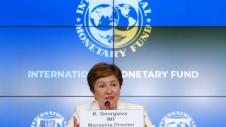In accordance with its statute, the Bank of Greece has submitted its annual Monetary Policy Report 2022-2023 to the Speaker of the Greek Parliament and the Cabinet, the BoG announced in a press release on Friday.
According to its projections, there will be an acceleration of recovery in Greece after 2023 and a gradual decline in inflation, with the economy projected to grow by 2.2% in 2023, by 3% in 2024 and 2.7% in 2025.
The inflation rate is seen easing to 4.3% in 2023 from 9.3% the previous year, and to decline further to 3.8% in 2024 and 2.3% in 2025, though food, non-energy industrial goods and services are expected to add to inflationary dynamics.
The bank's report noted the continued challenges as regards the goal of real convergence, given that Greece's per capita GDP corresponds to about 55% of the per capita GDP of euro area countries, compared with about 70% before the debt crisis.
"Catching up requires sustained growth rates well above the euro area average. Otherwise, it could take more than 15 years for the Greek economy to regain its pre-debt crisis level relative to the euro area. This necessary continued convergence process requires the implementation of substantial investments, which must either be financed by national savings or be covered by capital inflows from abroad. However, to enhance investment, in particular to attract foreign funds, the appropriate conditions have to be in place, i.e. a business-friendly environment, highly qualified and skilled human resources, high-level infrastructure and networks. Leaving the Greek economy’s structural weaknesses unaddressed would make it vulnerable to exogenous shocks that may halt the catching-up process that has resumed in the past few years," the bank said.
This performance can be achieved on condition that, in the external environment, the geopolitical crisis de-escalates, energy prices fall and the Eurosystem’s monetary policy tightening has a limited adverse impact on the euro area economy. In addition, the projections rest on the assumption of continued support of international tourism to the Greek economy, progress with the implementation of investment projects and a solid growth path of the euro area economy, which is Greece’s major trading partner, the BoG press release noted.
The central bank's report acknowledged that there are downside risks to the outlook for the Greek economy, which include: (i) a further deterioration of the external environment; (ii) higher and more persistent inflation; (iii) a lower-than-expected absorption rate of Next Generation EU funds; (iv) potential delays in implementing reforms, with negative effects on productivity and competitiveness; and (v) a further increase in interest rates, which could dampen growth and lead to the emergence of a new generation of NPLs. Upside risks, on the other hand, are associated with a faster fall in inflation and a better-than-expected performance of tourism.
Key challenges for the Greek economy are to obtain investment grade and at a later stage exceed it. This would enhance the resilience of the Greek economy to exogenous shocks and episodes of volatility in international markets, reduce the cost of raising capital for the public and private sectors, facilitate public debt management and foster investment and economic growth.
Even though Greece's public debt as a percentage of GDP remains the highest in the European Union and the second highest in the world, the central bank notes that in the medium term, risks to debt sustainability are contained, provided that the fiscal measures taken in response to the pandemic and energy crises are temporary and that the available European funds are effectively utilised. In the longer term, however, there is increased uncertainty, as the gradual refinancing of accumulated debt to the official sector on market terms will increase the exposure of Greek government debt to interest rate and market risk, leaving no room for relaxation of the agreed fiscal targets.
For this reason, the BoG recommends "a return to constant primary cyclically adjusted budget surpluses of 2% of GDP. This is necessary in the medium term as rising borrowing costs and lower growth and inflation reduce the dampening contribution of the implicit interest rate-growth differential to debt dynamics.
Another important challenge is that of addressing the current account deficit by enhancing the competitiveness and extroversion of the economy, even though the high deficit recorded in 2022 (9.7% of GDP) was due by about 40% to higher fuel prices and is expected to moderate to 7% of GDP in 2023, the report said.








